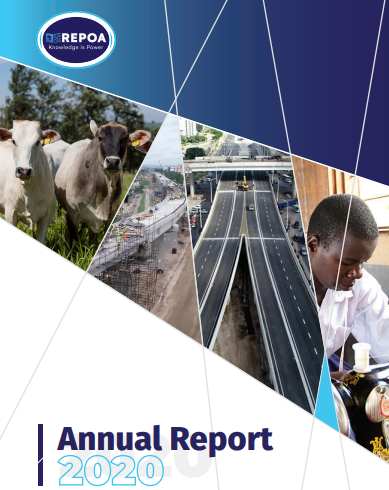INSTITUTIONAL ANALYSIS OF ENTERPRISE DEVELOPMENT CHALLENGES AND OPPORTUNITIES FOR TANZANIA
The overall objective of this research project is to identify institutional bottlenecks that limit competitiveness and enterprise development in the productive sectors– and the enabling policy framework to address them effectively. Specifically, the research project will seek to undertake three objectives, namely (i) Analysis of the institutional framework for enterprisedevelopment and competitiveness; (ii) Analysis of […]
REPOA Annual Report 2020

We are privileged to present to our esteemed stakeholders our annual report for 2020, the final year of the implementation of our fifth strategic plan, covering 2020–2024.
Enhancing Competitiveness of Rice Industry in Tanzania
This policy brief assesses rice production and consumption in Tanzania, the cultivated area of rice and yields obtained. It also presents the market dynamics of the rice sub-sector by assessing its exports, imports as well as its prices in the domestic and international market. Lastly, it presents challenges hindering trade competitiveness and provides policy recommendations […]
Do Conditional Cash Transfers Improve Mental Health? Evidence From Tanzania’s Governmental Social Protection Program
Cash transfer interventions broadly improve the lives of the vulnerable, making them exceedingly popular. However, evidence of impacts on mental health is limited, particularly for conditional cash transfer (CCT) programs. We examined the impacts of Tanzania’s government-run CCT program on depressive symptoms of youth aged 14-28. Despite no overall intervention effects, results suggest that receiving […]
Learning Environment and Performance
of Primary Education in Tanzania
This policy brief aims at assessing learning outcomes by looking at inputs, commitments and competencies of service providers in the education and health sectors. The survey was conducted in two rounds in 2014 and 2016/17. The two surveys had been preceded by a pilot conducted in 2010 in Tanzania and Senegal, which allows Tanzania to […]
Improving the provision of government einformation opportunities in Tanzania
The Internet has the potential to improve public administration, servicedelivery, and citizen engagement (Castells, 2009; Chadwick, 2006,2013). In the early 2000s, the Tanzania government adopted onlinegovernment information provision and established the technicalstandards and guidelines for government websites in 2014 (UnitedRepublic of Tanzania, 2014). E-information stands for provision ofinformation via government websites and social media pages. […]
Tanzania SDG Scorecard 2021
Survey findings provide citizens’ perspectives that can be compared to official UN indicators tracking progress on 12 of the 17 Sustainable Development Goals.
Citizens’ perceptions of the state of the economy and their livelihoods
At a glance Direction of the country: A majority of Tanzanians believe the country is going in the right direction and the government is handling the economy well. Country’s economic situation: The share of Tanzanians who say the country’s economic situation has improved has almost doubled. But only one in three describe their personal living […]
Enhancing Competitiveness in the Leather Industry in Tanzania
This policy brief assesses trade development and competitiveness of the leather value chain in Tanzania, focusing on market competitiveness and production capacity. It also assesses the challenges hindering the trade competitiveness of the leather industry and provides recommendations on how to boost the trade competitiveness of the leather sector given that Tanzania has a significant […]
The Implementation of Direct Health Facility Financing (DHFF): Prospects and Challenges
This policy brief summarizes findings from a field study that analyzed the prospects and challenges of implementing DHFF intervention. This qualitative study was conducted in four regions, namely Dodoma, Singida, Mwanza, and Tabora, covering one LGA in each region and one primary healthcare facility per LGA. The primary data was collected through interviewing central and […]
Trade, Productivity and competitiveness
This policy brief aims at assessing the trade development and competitiveness of Tanzania by assessing the productivity of its firms against the background of further integration into the East African Community (EAC). The note addresses both the export premium of an internationalization strategy, the opportunities for specialization within the EAC and the impact of the […]
Enhancing Competitiveness of Seaweed Industry in Zanzibar
This policy brief analyses recent trends in seaweed production and trade in Tanzania. It aims to appraise contemporary understandings of market dynamics which are key to informing competitive trade policy practices as well as implementation of Zanzibar’s Development Vision 2050 which among others, prioritizes the development of a competitive blue economy in the transformation of […]
Business environment and enterprise
competitiveness, diversification and value chain
This policy brief outlines some key findings from a survey of Nordic firms operating in Tanzania conducted in October and November 2019.The survey comprised of quantitative and qualitative assessments of perceptions of 105 sampled firms on the business environment. 65 firms responded to the quantitative survey, and a snowball sample of 30 firmsyielded 60 per […]
The effects of institutional bottlenecks on
enterprise development and competitiveness in
productive sectors in Tanzania.
This policy brief flags areas of crucial policy concerns in the context of the prevailing legal and regulatory framework for enterprise development and competitiveness. It draws on analyses and findings from REPOA’s Research Project on Institutional Analysis of Enterprise Development and Competitiveness (EDC) in Tanzania. The research draws on analyses of primary and secondary data […]
Leveraging Globalization to Reduce Inequality in
the Global South
Indeed, disparities and a lack of economic and social opportunities within country and across countries is creating a vicious cycle of inequality. The inequality challenge is intimately connected to pressing issues in the global business and trade environment. In many places, the growing tide of inequality is further swollen under the force of megatrends around […]
Designing for differences:
aligning incentives in Tanzania’s skills sector
Since the introduction of the Skills Development Levy (SDL) in Tanzania, the financing of skills training has been contested. The private sector has raised concerns about the size of the levy and the usefulness of training provided by VET centres, and has accused the government of misallocation and misuse of the raised levy. Lack of […]